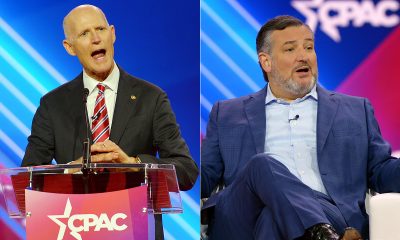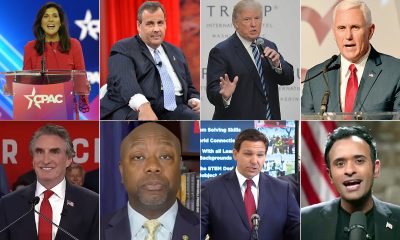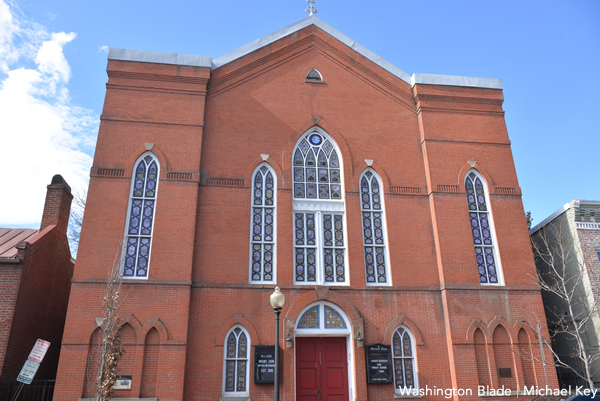Politics
Why is Rubio blocking a gay black judicial nominee?
Fla. senator continues 10-month delay on official he once supported
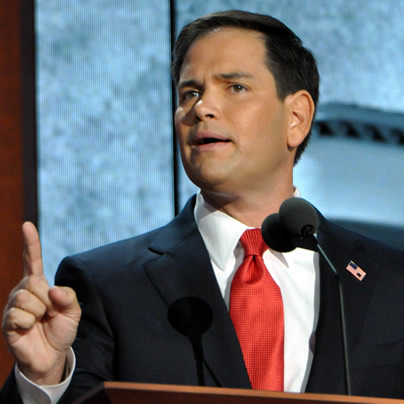
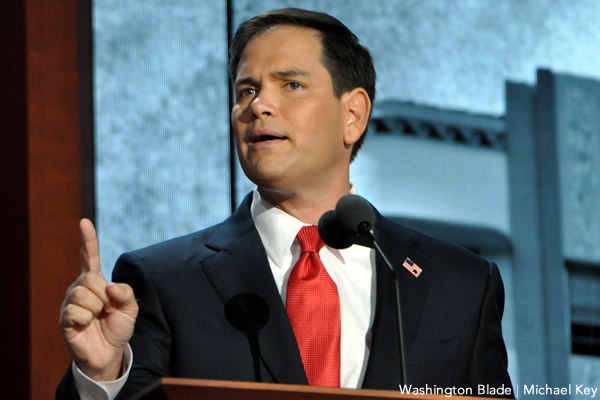
Sen. Marco Rubio is holding up the nomination of a judicial nominee who’d be the first openly gay black male to serve on the federal bench. (Blade file photo by Michael Key).
Sen. Marco Rubio (R-Fla.) is being criticized for his continued hold on a gay black judicial nominee pending before the Senate as observers of the confirmation process dismiss his reasons for blocking the confirmation.
Rubio has been withholding the “blue slip” for William Thomas, whom President Obama first nominated for a seat on the U.S. District Court for the Southern District of Florida nearly a year ago. If confirmed, Thomas would be the first openly gay black male to serve on the federal bench.
The Washington Blade reported in July that Rubio was blocking the nomination of Thomas along with Brian Davis, another black judicial nominee who was nominated for a seat on the U.S. District Court for the Middle District of Florida. But after Rubio last week lifted his hold on Davis, the continued obstruction of Thomas gained significant attention after The New York Times reported on the story.
Refusing to turn in the “blue slip” for a nomination — a responsibility for the U.S. senators representing the state where a judicial nominee would serve — effectively blocks the Senate Judiciary Committee from advancing the nomination. Opposing the Thomas nomination is a new position for Rubio, who initially recommended Thomas for the seat following the nominee’s approval by Florida’s Federal Judicial Nominating Commission.
In a statement to the Blade, Brooke Sammon, a Rubio spokesperson, confirmed Rubio opposes the Thomas nomination.
“The nomination of Judge Thomas has also been thoroughly reviewed, and Sen. Rubio has determined that Thomas’s record on the state court raises serious concerns about his fitness for a lifetime federal appointment,” she said. “After reviewing Thomas’s record, Senator Rubio cannot support moving forward with the nomination at this time.
The senator’s office provided a long list of reported actions by Thomas in his role as a state judge in the Miami-Dade Circuit. They involve two cases over which Thomas presided.
One is the case of Michael Traverso, who killed a cyclist in a hit-and-run accident while driving on a suspended license. Rubio’s office cites concerns that Thomas sentenced Traverso to the minimum sentence of 22.8 months in jail, less time served, amounting to only 364 days.
The other involves Joel Lebron, who took part in the 2002 gang rape and murder of 18-year-old Ana Maria Angel. According to Rubio’s office, Thomas twice suppressed confessions of perpetrators of the crime including the confession of Lebron, who pulled the trigger.
Another objection cited by Rubio’s office: Thomas broke down in tears in January while sentencing Lebron to death. His office cites a Miami Herald report, but that article says Thomas wept not for Lebron, but the victim as he was reading the circumstances of the murder.
In both of these rulings, Rubio’s office says an appellate court overturned Judge Thomas in whole or in part. Additionally, Rubio’s office contends a death sentence imposed on another defendant was also reversed because Thomas “improperly” allowed certain testimony.
Rubio has supported gay judicial nominees before. Just this week, Rubio was among the 98 senators who unanimously confirmed Todd Hughes as a U.S. Circuit Judge for the U.S. Court of Appeals for the Federal Circuit.
The reasons that Rubio’s office offered for blocking the nomination are in dispute. As reported by the Blade in July, Nushin Sayfie, administrative judge for the criminal division of the Eleventh Judicial Circuit in Florida, has attempted to allay concerns about the Traverso case.
In a July 19 letter to Rubio, Sayfie writes the sentence Thomas gave in the case was within his guideline range and, unlike what the media reported, the defendant wasn’t charged with the death of the victim, but “charged with leaving the scene of an accident (involving death).”
A similar letter to Rubio asserting that Thomas acted responsibly in the case was written in January by the prosecutor in the case, Jane Anderson.
The Alliance of Justice, which tracks judicial nominations, has also raised points countering Rubio’s objection to the handling of the Lebron case.
Michelle Schwartz, director of justice programs for the Alliance for Justice, said the details of those proceedings were well-known before the Thomas nomination was made.
“The decision in the Lebron case to which Rubio now claims to object occurred six years ago (and Thomas sentenced one of the defendants to death),” Schwartz said. “Remember, Rubio first said he would support Thomas, then changed his mind. If a six-year-old decision was the issue, why did Rubio ever claim to support Thomas in the first place?”
LGBT advocates are also criticizing Rubio for his continued obstruction of the Thomas nomination and say it’s for reasons other than what his office has disclosed.
Nadine Smith, executive director of the statewide LGBT group Equality Florida, accused Rubio in a statement on Wednesday of pandering to Tea Party extremists by sabotaging the nomination of a gay, black judicial nominee.
“Once again, we see Senator Rubio playing politics when it comes to what’s best for Florida,” Smith said. “He is keeping a qualified nominee from the bench to appease extremists.”
John Aravosis, editor of AMERICAblog, accuses Rubio in a blog posting of blocking Thomas over the judicial nominee’s sexual orientation.
“I’m always intrigued when men who come off, to me at least, as rather queer act out against gay people,” Aravosis writes. “It makes me wonder if they’re projecting – or less subtly, using their public homophobia as some kind of private beard to convince their followers (and themselves?) that they’re not really closet cases.”
For its part, the White House is publicly expressing no consideration of withdrawing the nominee.
Shin Inouye, a White House spokesperson, repeated what he told the Blade in July when asked if Obama was rethinking the Thomas nomination.
“President Obama nominated Judge William Thomas more than 10 months ago,” Inouye said. “This judicial vacancy has been declared a ‘judicial emergency,’ and the non-partisan American Bar Association has rated Judge Thomas ‘well-qualified.’ Unfortunately, his nomination continues to be stalled, and the Senate should promptly consider it without further delay.”
Politics
After Biden signs TikTok ban its CEO vows federal court battle
“Rest assured, we aren’t going anywhere,” CEO said

President Joe Biden signed an appropriations bill into law on Wednesday that provides multi-billion dollar funding and military aid for Ukraine, Israel, and Taiwan after months of delay and Congressional infighting.
A separate bill Biden signed within the aid package contained a bipartisan provision that will ban the popular social media app TikTok from the United States if its Chinese parent company ByteDance does not sell off the American subsidiary.
Reacting, TikTok CEO Shou Zi Chew said Wednesday that the Culver City, Calif.-based company would go to court to try to remain online in the U.S.
In a video posted on the company’s social media accounts, Chew denounced the potential ban: “Make no mistake, this is a ban, a ban of TikTok and a ban on you and your voice,” Chew said. “Rest assured, we aren’t going anywhere. We are confident and we will keep fighting for your rights in the courts. The facts and the constitution are on our side, and we expect to prevail,” he added.
Our response to the TikTok Ban Bill in the US: https://t.co/LpoE67sxHo
— TikTokComms (@TikTokComms) April 24, 2024
White House Press Secretary Karine Jean-Pierre adamantly denied during a press briefing on Wednesday that the bill constitutes a ban, reiterating the administration’s hope that TikTok will be purchased by a third-party buyer and referencing media reports about the many firms that are interested.
Chew has repeatedly testified in both the House and Senate regarding ByteDance’s ability to mine personal data of its 170 million plus American subscribers, maintaining that user data is secure and not shared with either ByteDance nor agencies of the Chinese government. The testimony failed to assuage lawmakers’ doubts.
In an email, the former chair of the House Intelligence Committee, U.S. Rep. Adam Schiff (D-Calif.), who doesn’t support a blanket ban of the app, told the Washington Blade:
“As the former chairman of the House Intelligence Committee, I have long worked to safeguard Americans’ freedoms and security both at home and abroad. The Chinese Communist Party’s ability to exploit private user data and to manipulate public opinion through TikTok present serious national security concerns. For that reason, I believe that divestiture presents the best option to preserve access to the platform, while ameliorating these risks. I do not support a ban on TikTok while there are other less restrictive means available, and this legislation will give the administration the leverage and authority to require divestiture.”
A spokesperson for U.S. Sen. Alex Padilla (D-Calif.) told the Blade: “Senator Padilla believes we can support speech and creativity while also protecting data privacy and security. TikTok’s relationship to the Chinese Communist Party poses significant data privacy concerns. He will continue working with the Biden-Harris administration and his colleagues in Congress to safeguard Americans’ data privacy and foster continued innovation.”
The law, which gives ByteDance 270 days to divest TikTok’s U.S. assets, expires with a January 19, 2025 deadline for a sale. The date is one day before Biden’s term is set to expire, although he could extend the deadline by three months if he determines ByteDance is making progress or the transaction faces uncertainty in a federal court.
Former President Donald Trump’s executive order in 2020, which sought to ban TikTok and Chinese-owned WeChat, a unit of Beijing-based Tencent, in the U.S., was blocked by federal courts.
TikTok has previously fought efforts to ban its widely popular app by the state of Montana last year, in a case that saw a federal judge in Helena block that state ban, citing free-speech grounds.
The South China Morning Post reported this week that the four-year battle over TikTok is a significant front in a war over the internet and technology between Washington and Beijing. Last week, Apple said China had ordered it to remove Meta Platforms’s WhatsApp and Threads from its App Store in China over Chinese national security concerns.
A spokesperson for the ACLU told the Blade in a statement that “banning or requiring divestiture of TikTok would set an alarming global precedent for excessive government control over social media platforms.”
LGBTQ TikToker users are alarmed, fearing that a ban will represent the disruption of networks of support and activism. However, queer social media influencers who operate on multiple platforms expressed some doubts as to long term impact.
Los Angeles Blade contributor Chris Stanley told the Blade:
“It might affect us slightly, because TikTok is so easy to go viral on. Which obviously means more brand deals, etc. However they also suppress and shadow ban LGBTQ creators frequently. But we will definitely be focusing our energy more on other platforms with this uncertainty going forward. Lucky for us, we aren’t one trick ponies and have multiple other platforms built.”
Brooklyn, N.Y.,-based gay social media creator and influencer Artem Bezrukavenko told the Blade:
“For smart creators it won’t because they have multiple platforms. For people who put all their livelihood yes. Like people who do livestreams,” he said adding: “Personally I’m happy it gets banned or American company will own it so they will be less homophobic to us.”
TikTok’s LGBTQ following has generally positive experiences although there have been widely reported instances of users, notably transgender users, seemingly targeted by the platform’s algorithms and having their accounts banned or repeatedly suspended.
Of greater concern is the staggering rise in anti-LGBTQ violence and threats on the platform prompting LGBTQ advocacy group GLAAD, in its annual Social Media Safety Index, to give TikTok a failing score on LGBTQ safety.
Additional reporting by Christopher Kane
Politics
Smithsonian staff concerned about future of LGBTQ programming amid GOP scrutiny
Secretary Lonnie Bunch says ‘LGBTQ+ content is welcome’

Staff at the Smithsonian Institution are concerned about the future of LGBTQ programming as several events featuring a drag performer were cancelled or postponed following scrutiny by House Republicans, according to emails reviewed by the Washington Post.
In December, Secretary Lonnie G. Bunch III appeared before a hearing led by GOP members of the Committee on House Administration, who flagged concerns about the Smithsonian’s involvement in “the Left’s indoctrination of our children.”
Under questioning from U.S. Rep. Stephanie Bice (R-Okla.), Bunch said he was “surprised” to learn the Smithsonian had hosted six drag events over the past three years, telling the lawmakers “It’s not appropriate to expose children” to these performances.
Collaborations with drag artist Pattie Gonia in December, January, and March were subsequently postponed or cancelled, the Post reported on Saturday, adding that a Smithsonian spokesperson blamed “budgetary constraints and other resource issues” and the museums are still developing programming for Pride month in June.
“I, along with all senior leaders, take seriously the concerns expressed by staff and will continue to do so,” Bunch said in a statement to the paper. “As we have reiterated, LGBTQ+ content is welcome at the Smithsonian.”
The secretary sent an email on Friday expressing plans to meet with leaders of the Smithsonian Pride Alliance, one of the two groups that detailed their concerns to him following December’s hearing.
Bunch told the Pride Alliance in January that with his response to Bice’s question, his intention was to “immediately stress that the Smithsonian does not expose children to inappropriate content.”
“A hearing setting does not give you ample time to expand,” he said, adding that with more time he would have spoken “more broadly about the merits and goals of our programming and content development and how we equip parents to make choices about what content their children experience.”
Politics
Survey finds support for Biden among LGBTQ adults persists despite misgivings
Data for Progress previewed the results exclusively with the Blade

A new survey by Data for Progress found LGBTQ adults overwhelmingly favor President Joe Biden and Democrats over his 2024 rival former President Donald Trump and Republicans, but responses to other questions may signal potential headwinds for Biden’s reelection campaign.
The organization shared the findings of its poll, which included 873 respondents from across the country including an oversample of transgender adults, exclusively with the Washington Blade on Thursday.
Despite the clear margin of support for the president, with only 22 percent of respondents reporting that they have a very favorable or somewhat favorable opinion of Trump, answers were more mixed when it came to assessments of Biden’s performance over the past four years and his party’s record of protecting queer and trans Americans.
Forty-five percent of respondents said the Biden-Harris administration has performed better than they expected, while 47 percent said the administration’s record has been worse than they anticipated. A greater margin of trans adults in the survey — 52 vs. 37 percent — said their expectations were not met.
Seventy precent of all LGBTQ respondents and 81 percent of those who identify as trans said the Democratic Party should be doing more for queer and trans folks, while just 24 percent of all survey participants and 17 percent of trans participants agreed the party is already doing enough.
With respect to the issues respondents care about the most when deciding between the candidates on their ballots, LGBTQ issues were second only to the economy, eclipsing other considerations like abortion and threats to democracy.
These answers may reflect heightened fear and anxiety among LGBTQ adults as a consequence of the dramatic uptick over the past few years in rhetorical, legislative, and violent bias-motivated attacks against the community, especially targeting queer and trans folks.
The survey found that while LGBTQ adults are highly motivated to vote in November, there are signs of ennui. For example, enthusiasm was substantially lower among those aged 18 to 24 and 25 to 39 compared with adults 40 and older. And a plurality of younger LGBTQ respondents said they believe that neither of the country’s two major political parties care about them.

